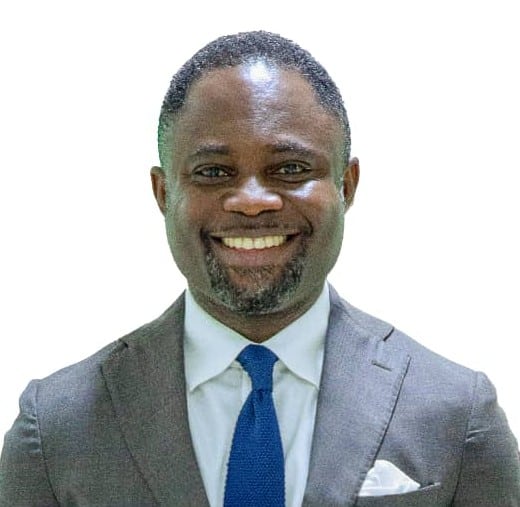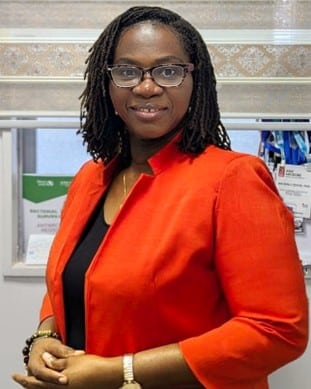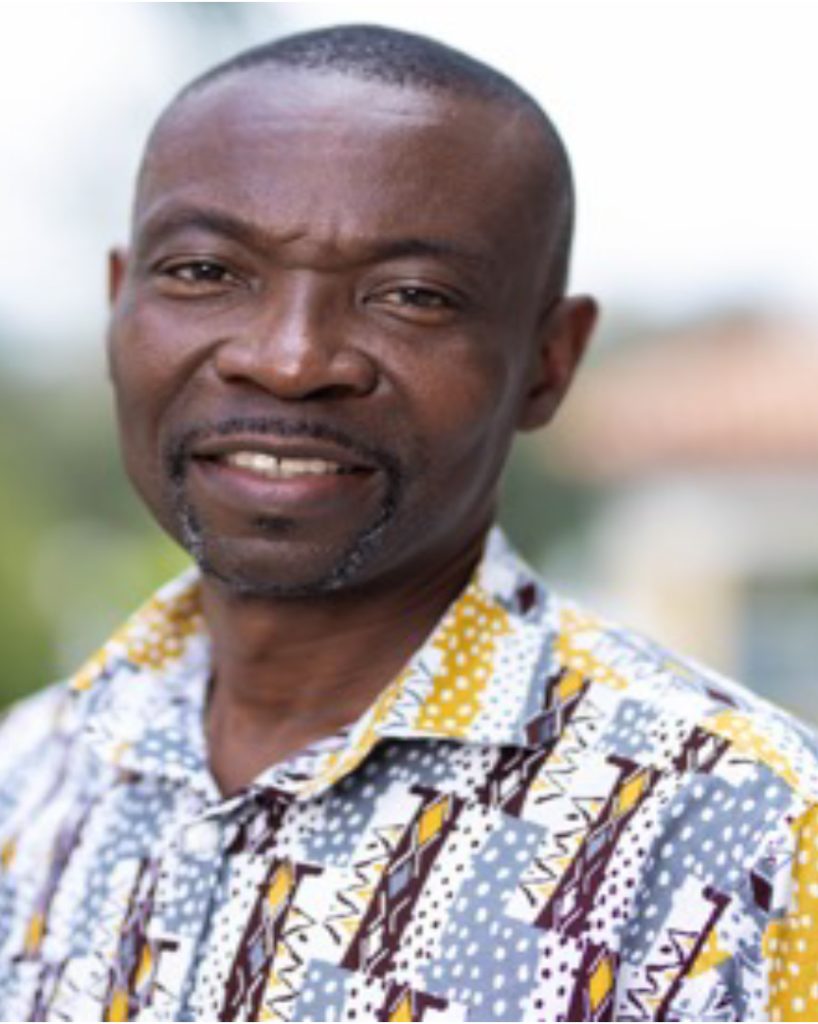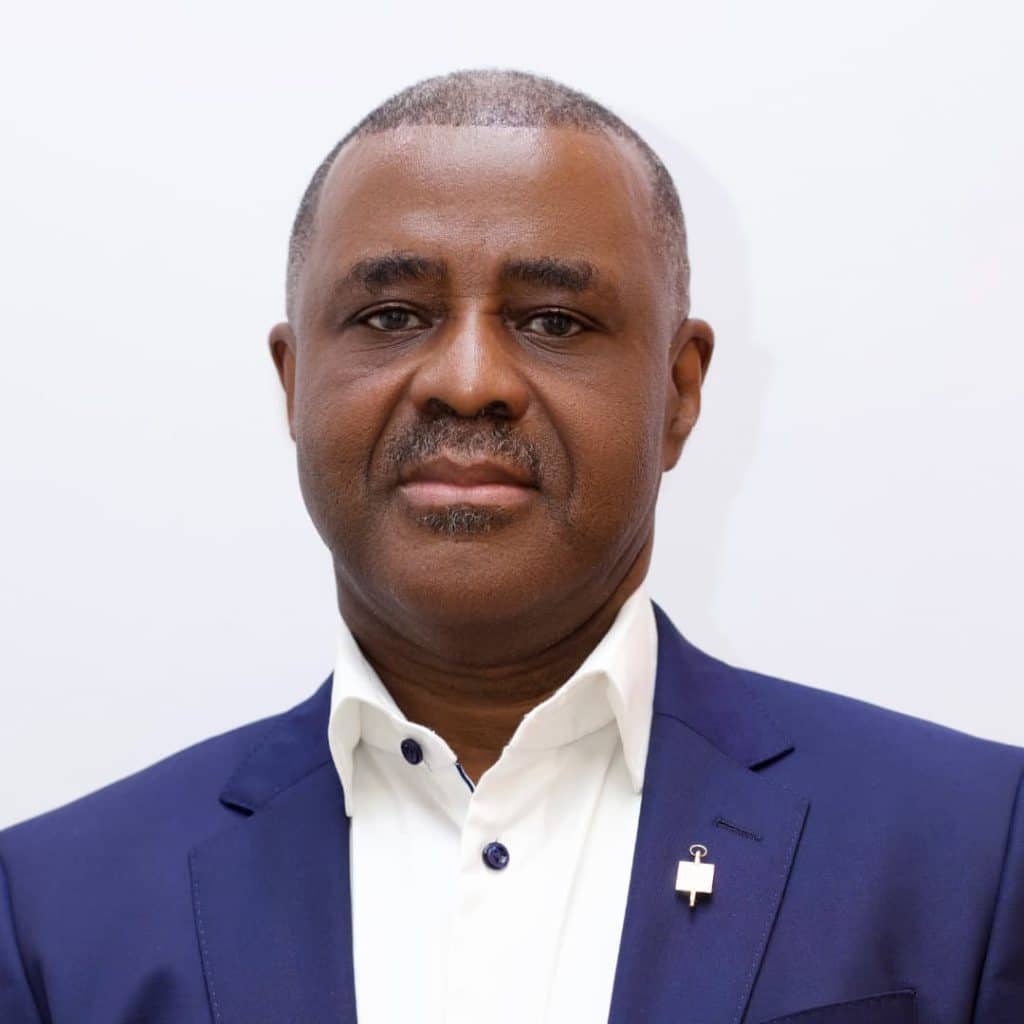
KWABENA MINTAH AKANDOH (MP)
Kwabena Mintah Akandoh is a dedicated public servant, experienced legislator, and accomplished professional with a strong background in mathematics, law, and health systems management. As the Member of Parliament for the Juaboso Constituency since 2013, he has demonstrated exemplary leadership and advocacy for improved health policies and social development in Ghana. His extensive public service experience includes serving as the Deputy Minister for Lands and Natural Resources and the Ranking Member for the Health Committee of Parliament from 2019 to 2024.
With an LLB and an LLM, coupled with specialized training in health systems management and social security, he is committed to advancing equitable health financing and policy development.
His passion for public service is complemented by his entrepreneurial spirit. He is one of Ghana’s leading rice farmers, contributing to the nation’s agricultural development. He is currently the Minister for Health.

Prof. Abdoulaye Djimdé is a CAMES Professor of Parasitology and Mycology at the Malaria Research and Training Centre University of Science, Techniques and Technologies of Bamako, Mali and a Calestous Juma Research Leadership Fellow. He leads a dynamic research group whose primary focus is to understand how variations in the genomes of the malaria parasite, the human host, and the mosquito vector relate to disease outcomes like the spread of antimalarial drug resistance. His translational research programme uses molecular and genetic approaches to tackle important problems in malaria control.
As founding President of the Pathogens genomic Diversity Network Africa (PDNA, pathogens-dna.org), which includes scientists from 16 sub-Saharan African countries he leads efforts in bringing knowledge derived from pathogens genetics and genomics to help solve public health problems through research, training, capacity development and engagements activities with the communities, and health policy decision makers.
As a strong proponent of capacity building for African research and collaborative research networks, Djimde is also involved in good citizenship within the African research community. He was instrumental in the formation of the Worldwide Antimalarial Drug Resistance Network, on whose Scientific Advisory Board he serves. Currently he serves as coordinator of the West African Network for Clinical Trials of Antimalarial Drugs (WANECAM, wanecam.org), and President of the African Association for research and control of AntiMicrobial Resistance (AAAMR, africaamr.org). To date he has published more than 200 peer reviewed original research in the scientific literature.

Prof. Beverly Egyir is an Associate Professor in the Bacteriology Department at the Noguchi Memorial Institute for Medical Research, University of Ghana. She holds a PhD in Molecular Bacteriology and Infection from the University of Copenhagen, Denmark, funded by the Danish International Development Agency through the Antibiotic Drug Use Monitoring and Evaluation of Resistance Project. She also completed postdoctoral training at the University of Cambridge, United Kingdom, supported by the ALBORADA Trust under the Cambridge-Africa Partnership for Research Excellence.
Prof. Egyir’s research focuses on surveillance of antimicrobial resistant (AMR) bacteria species from humans, animals, food, water, and the environment. She employs both phenotypic and molecular tools, including whole genome sequencing, to investigate AMR trends and dynamics. Her work is dedicated to tackling AMR through research, surveillance, and capacity-building initiatives across the African continent. She currently leads a multidisciplinary team with expertise in microbiology, sequencing, bioinformatics, and AMR data management. Over the years, she has directly trained and supervised several young scientists—both undergraduate and postgraduate—and has organized AMR-focused workshops involving participants from several African countries. Prof. Egyir is the author of numerous peer-reviewed publications and is actively involved in key national and international AMR networks. These include the SEQAFRICA Consortium, Wellcome Trust SEDRIC Genomics for AMR Surveillance Working Group, the Africa CDC Pathogen Genomics Initiative AMR Focus Group, Tanzanian Fleming Fellowship Scheme, PulseNet-Africa, and Ghana’s National Antimicrobial Resistance Coordinating Group.

Prof. Richard K. Amewu: He is an Associate Professor in Medicinal/Organic Chemistry at the Department of Chemistry/School of Physical and Mathematical Sciences/College of Basic and Applied Sciences, University of Ghana, Accra. He obtained his Ph.D. and master’s degree from University of Liverpool and bachelor’s degree from University of Science and Technology now Kwame Nkrumah University of Science and Technology, Kumasi, Ghana. His research interest is in the synthesis of small molecules for medicinal use. He is the founder and leader of the Drug Innovation Group based at the Department of Chemistry, University of Ghana.

Prof. Anita Ghansah is an eminent Ghanaian Genomic Epidemiologist and Associate Professor of Genetic Epidemiology at the Noguchi Memorial Institute for Medical Research (NMIMR), University of Ghana, where she serves as Head of the Department of Parasitology.
She earned her PhD in Genetic Epidemiology from the London School of Hygiene and Tropical Medicine, with three years of advanced genomics training at the Wellcome Trust Centre for Human Genetics, University of Oxford. As an Exxon Mobil Malaria Scholar, she completed her postdoctoral training at Harvard T. H Chan School of Public health.
Her research focuses on translational genomics for malaria and other infectious diseases, leveraging genomic insights to inform disease control and elimination strategies. She has a strong interest in disease susceptibility genes and genomic adaptation in both human and pathogen populations. Prof. Ghansah is widely recognized as an expert in malaria genomic surveillance, and she has served on Africa CDC and WHO technical committees that develop strategies for malaria elimination and drug resistance monitoring across Africa. She is one of the inaugural cohort members of the prestigious Calestous Juma Science Leadership Fellowship (a Gates Foundation fellowship), where she leads the development of novel, affordable malaria molecular surveillance tools for Ghana.
Currently, Prof. Ghansah is the Malaria Project Lead for an EDCTP3-supported, EU-funded multi-country grant on genomic surveillance of TB and malaria. Her work focuses on developing innovative genomic tools to study drug resistance, parasite diversity, and to identify novel drug and vaccine targets. In addition, she is Deputy Director of DELGEME Plus (Developing Excellence in Leadership, Genomics and Epidemiology for Malaria Elimination and Antimicrobial Resistance Control in Africa), a Wellcome Trust DELTAS-funded programme.
Beyond malaria, she has contributed to studies on the genetics of chronic kidney disease, bioinformatics capacity building across Africa, and lately hookworm genomics. She is deeply committed to advancing biobanking and data science for future biomedical research in Ghana. As a passionate mentor, she has nurtured numerous researchers and students, supporting their career development.

Dr. Paul Sekyere-Nyantakyi
Transformational Leader in Medical Diagnostics
Dr. Paul Sekyere-Nyantakyi is a pioneering physician entrepreneur with over 25 years of experience advancing evidence-based medicine through diagnostics, research, and clinical trials. A graduate of Randolph-Macon College (BSc Biology, Magna Cum Laude, Phi Beta Kappa) and The Johns Hopkins School of Medicine (MD), with internship training at Yale Medical School, Dr. Sekyere-Nyantakyi has redefined laboratory medicine in Ghana.
He is the founder of Quest Healthcare, MDS-Lancet Laboratories Ghana Ltd., Quest Medical Imaging Ltd., and Wacrec Clinical Research Management (WACREC)—a network of medical laboratory and radiology centers serving over 2,000 patients daily across 30+ locations. His leadership integrates innovative technology with patient-centered care, setting new standards in healthcare delivery and accessibility.
Dr. Sekyere-Nyantakyi’s visionary impact has earned him numerous accolades, including:
- The Global Achievement Award from The Johns Hopkins School of Medicine. The Award honors alumni who exemplify the Johns Hopkins tradition of excellence and have brought credit to the university and their profession in the international arena through their professional achievements or humanitarian service.
- An Honorary Doctor of Science Degree conferred by Randolph-Macon College in recognition of his contributions to science and public health.
- European Quality Award from The Academic Union Oxford, reflecting his steadfast commitment to quality.
- Multiple CEO and healthcare leadership honors across Ghana.
Dr. Sekyere-Nyantakyi’s blend of medical expertise, enterprising spirit, and commitment to innovation has positioned him as a pioneer in Ghana’s medical diagnostics landscape.

